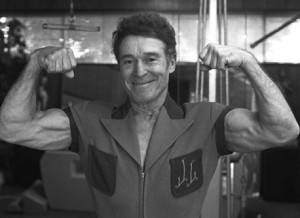He ditched the sugar and banished his headaches. Then came his first gym. But that was just the beginning. Soon enough, Jack LaLanne was fanning the flames of a revolution in fitness – and media.
By Jennah Feeley
Long before Richard Simmons, Jane Fonda and Jenny Craig, there was Jack Lalanne. Early-morning Bay Area television viewers may have been shocked to catch LaLanne’s 15-minute local morning program on KGO-TV in 1951. Who was this guy bouncing around on screen after the early morning newscast at a time when most Americans jump-started their day with bacon, eggs, hash browns and cigarettes?
The Jack LaLanne Show was a revolution in media. Donning his signature tailored jumpsuit, LaLanne led viewers into America’s health revolution. His show was the first of its kind, a prototype for endless televised workout programs to come.
Several generations fondly remember The Jack LaLanne Show as part of their morning routine. He created a health movement in America and laid the groundwork for fitness media.
The Jack LaLanne Show began by reaching out to housewives and children at home, teaching simple exercises and preaching the importance of maintaining a healthful diet. LaLanne initially paid for the airtime himself to promote his Oakland gym and health products.
LaLanne soon became America’s first fitness personality in 1959 when the ABC television network picked up the show, airing it until 1985. He captivated audiences with his radical ideas and his impressive physical feats and became famous for his self-named juicer and chain of gyms.
He delivered his message with personality, always repeating catchy phrases to get his point across. When describing dietary recommendations he often said: “If man made it, don’t eat it. If it tastes good, spit it out.”
Born Francois Henri LaLanne in San Francisco, 1914, he grew up in Bakersfield, returning to the Bay Area as a teen. A self-proclaimed “sugarholic,” LaLanne was a manic youth, which he blamed on his unhealthy diet.
“I was a psycho, had these headaches all the day, couldn’t stand the pain. All from sugar, sugar, sugar,” LaLanne told NPR in 2004.
LaLanne’s mother dragged him to a health lecture when he was 15, a transformative experience. The next day he cut sugar out of his diet and joined the Berkeley YMCA.
Often called the “Godfather of Fitness,” LaLanne established a career in physical well-being long before the likes of Weight Watchers. He opened his first gym in 1936 in Oakland and is credited with inventing some of today’s most popular workout equipment.
At that time, many considered LaLanne a fanatic. Doctors warned against his methods, claiming the exercises he promoted would cause health problems in men and masculinity in women. Despite the critics, LaLanne continued spreading his philosophy.
“Word got around. That Jack LaLanne – he’s not a wacko after all. People started buying me free drinks, and girls were giving me their phone numbers. I was runner-up Mr. America in the ’40s. I felt like I was the King of Fitness, boy. It was perfect,” LaLanne told The San Francisco Chronicle in 2003.
LaLanne met his wife, Elaine, at San Francisco’s KGO-TV studios. The two were married for more than 50 years and were partners in all of LaLanne’s business endeavors.
The New York Times, in its 2011 obituary, reported that LaLanne, at age 60, swam from Alcatraz Island to Fisherman’s Wharf handcuffed, shackled and towing a 1,000-pound boat. At 70, handcuffed and shackled again, he towed 70 boats, carrying a total of 70 people, 1 1/2 miles through Long Beach Harbor.
LaLanne ate two meals a day and shunned snacks. Breakfast, after his morning workout, usually included several hard-boiled egg whites, a cup of broth, oatmeal with soy milk and seasonal fruit. For dinner he took his wife, Elaine, to restaurants that knew what he wanted: a salad with raw vegetables and egg whites along with fish – often salmon – and a mixture of red and white wine. He sometimes allowed himself a roast turkey sandwich, but never a cup of coffee.
LaLanne died in 2011 at 96 in Morro Bay from a respiratory failure caused by pneumonia. The ever-committed athlete, he was reported to have been working out just days before his death.
♦
Jennah Feeley is a Northern California Media Museum writer majoring in Journalism at San Francisco State. A Palo Alto native, she also works for a San Francisco startup in the Mission District.

